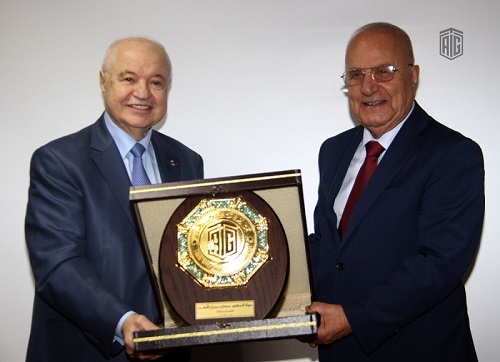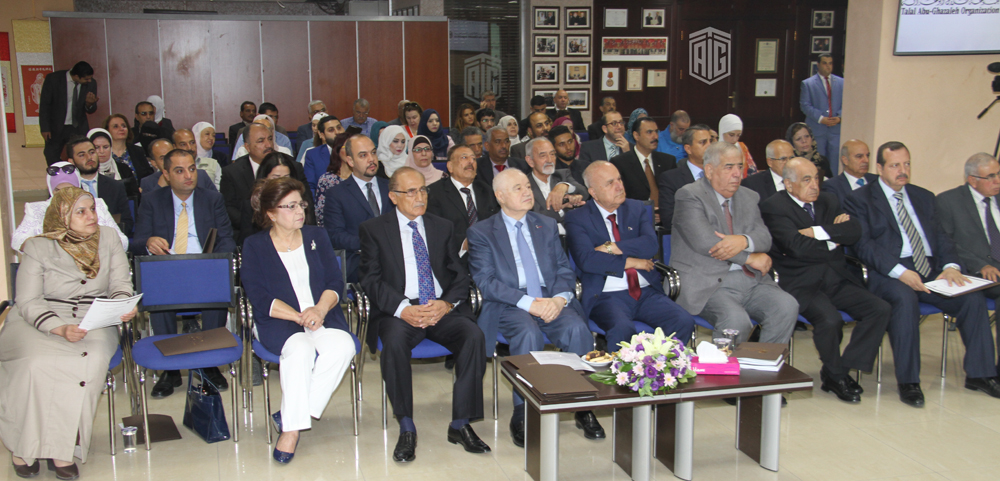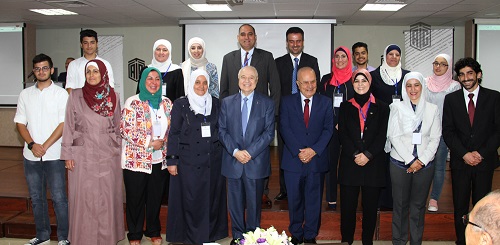13-Sep-2017
Talal Abu-Ghazaleh Knowledge Forum Holds “Developing Education is the Core for Reform” Conference
AMMAN - The Talal Abu-Ghazaleh Knowledge Forum (TAGKF) Programs for Children Committee organized a conference on “Developing Education is the Core for Reform” under the patronage of HE Dr. Adnan Badran, former prime minister and Chairman of the Higher Council of the National Center for Curriculum Development (NCCD).
 In his welcoming remarks at the opening session, HE Dr. Talal Abu-Ghazaleh stressed the importance of education and knowledge in restoring the glory of the Arab world, which once was the cradle of civilizations and science: stating that it will again lead the world in knowledge, science and change.
In his welcoming remarks at the opening session, HE Dr. Talal Abu-Ghazaleh stressed the importance of education and knowledge in restoring the glory of the Arab world, which once was the cradle of civilizations and science: stating that it will again lead the world in knowledge, science and change.
Dr. Abu-Ghazaleh expressed gratitude to all TAGKF committees particularly the Programs for Children Committee, which organized this event, pointing out that the seminar conclusions and recommendations will be submitted to HE Dr. Adnan Badran in the hope that they contribute to NCCD efforts.
Dr. Abu-Ghazaleh further re affirmed that the Talal Abu-Ghazaleh Organization (TAG-Org) seeks to support education through its various programs, explaining that the Organization’s current plan seeks to widely disseminate knowledge and science by the year 2040..
 Dr. Abu Ghazaleh noted that these programs include the enrichment of the Arabic content on the Internet, through the TAGIPEDIA project- launched two years ago- that by the end of this year will reach 2 million articles. They also include, he said, TAG-Org’s Fluency in Arabic Language Test that will serve Arabic-speakers as well as those interested in learning the Arabic language. To that Dr. Abu Ghazaleh added the promotion of learning the English language in cooperation with a Cambridge University program and the Organization’s ongoing endeavor to promote knowledge through the Talal Abu-Ghazaleh International Diploma in IT aSkills (TAG-DIT).
Dr. Abu Ghazaleh noted that these programs include the enrichment of the Arabic content on the Internet, through the TAGIPEDIA project- launched two years ago- that by the end of this year will reach 2 million articles. They also include, he said, TAG-Org’s Fluency in Arabic Language Test that will serve Arabic-speakers as well as those interested in learning the Arabic language. To that Dr. Abu Ghazaleh added the promotion of learning the English language in cooperation with a Cambridge University program and the Organization’s ongoing endeavor to promote knowledge through the Talal Abu-Ghazaleh International Diploma in IT aSkills (TAG-DIT).
For his part, Dr. Badran called for a white revolution that takes into account the Jordanian human being and deals with him as a human fortune.
 “Jordan was a regional pioneer in Education, however, it witnessed a decline. We have to save public and higher education and set them as top priorities on our national agenda, the process is easy and not as complicated as people might think, yet, it needs the will.” Dr. Badran said.
“Jordan was a regional pioneer in Education, however, it witnessed a decline. We have to save public and higher education and set them as top priorities on our national agenda, the process is easy and not as complicated as people might think, yet, it needs the will.” Dr. Badran said.
Referring to HM King Abdullah II 7th Discussion Paper, titled “Developing Human Resources and Education Imperative for Jordan’s Progress”, Dr. Badran quoted the paragraph in which the King said: “Schools should graduate students who know how to think, how to learn, how to seize opportunities and how to develop innovative problem-solving skills. This calls for a modern educational system that expands students’ horizons….”
Dr. Badran affirmed that the NCCD participated in various discussion sessions on the development of curriculum and there is a consensus on the necessity of developing curriculum, schoolbooks, teaching methods and exams as well as the importance of using modern technologies in teaching, testing and evaluation, correction, and qualifying teachers by training them, using modern techniques and practical implementation.
Meanwhile, Dr. Randa Amayri, conference manager, said that this event comes within the vision of developing education as a core for reform in conformity in light of guidelines included in the 7th Discussion Paper of HM King Abdullah II.
At the end of the opening ceremony, Dr. Abu-Ghazaleh exchanged honorary shields with Dr. Badran in addition to honoring members of the Programs for Children Committee.
At the end of the conference, the participants called for a review of the admission policy at community colleges and universities, encouraging admission of outstanding students, revising the role and independence of teachers in teaching and implementing the curriculum; stressing at the same time relations of cooperation, participation and mutual exchange of knowledge rather than competition.
The participants also urged the necessity for preparing teachers and motivating them to become leaders in the learning and the teaching process. They also stressed the need for coordination between the Ministry of Education and the other education faculties at the public universities towards objective selection of outstanding graduates to train and prepare for making positive change in education and teaching.